(MISA/IFEX) – On 13 March 2002, the Malawi Revenue Authority (MRA) stormed the premises of the Blantyre Printing and Publishing (BP&P) group of companies, a parent body of Blantyre Newspapers Limited (BNL), publishers of the “Daily Times” and “Malawi News”, and impounded a number of vehicles belonging to various divisions of the conglomerate. The move […]
(MISA/IFEX) – On 13 March 2002, the Malawi Revenue Authority (MRA) stormed the premises of the Blantyre Printing and Publishing (BP&P) group of companies, a parent body of Blantyre Newspapers Limited (BNL), publishers of the “Daily Times” and “Malawi News”, and impounded a number of vehicles belonging to various divisions of the conglomerate.
The move occurred shortly after editorials critical of the government appeared in the “Daily Times”, a flagship of the BNL, over the past few days. The editorials have questioned the rationale behind President Bakili Muluzi’s decision to release funds to rehabilitate Television Malawi and build houses for poor people on the spur of the moment. This is all occurring as the country’s citizens are suffering from excruciating hunger created by an acute maize shortage.
According to BNL’s managing editor, Jika Nkolokosa, the MRA went to BP&P without notice, despite the agreement between the tax collectors and the company allowing the BP&P to settle its tax arrears in installments. This action, said Nkolokosa, raised fears that the government was behind the move as a way of gagging the paper.
However, Nkolokosa would neither say how much his company owed the MRA nor how many vehicles belonging to the newspaper division have been impounded. Nkolokosa said the newspaper would continue to appear on the street as his division’s vehicles, printing press and computers have not been impounded.
MRA publicist Kitty Chinseu dismissed the allegation that the move was politically motivated. She said MRA was not obliged to issue a warning to BP&P on the action they have taken. The company might have defaulted on its repayments, Chinseu said, although she could not say with certainty whether this was the reason for the MRA action.
However, Nkolokosa indicated to MISA that on previous occasions when BP&P had defaulted on payment, the MRA had declared its intent to act against the company. The company has since been making payments faithfully by certified cheque. “There is no good reason why this should have happened,” Nkolokosa told MISA, confirming his suspicion that this latest action against BP&P was politically motivated.
BP&P financial controller Mark Chiutsankhondo could not comment on the issue as he was locked up in a management meeting discussing the issue.
Background Information
During the past few days, the “Daily Times” has written three editorials questioning the rationale behind some directives issued by President Muluzi to the Finance Ministry to release funds for activities that were not included in the present budget.
For instance, the newspaper questioned where the finance minister was going to get the money to fund a village housing scheme for the poor initiated by the president. The World Bank refused to include the scheme in its current funding programme. The scheme, according to the newspaper, lacks structures to ensure fairness in the houses’ ownership – especially considering the demise of present owners who are perceived to be poor and needing government support.
Second, the newspaper questioned why the president ordered the Finance Ministry to allocate K10m (approx. US$137,580) towards repairing Television Malawi. The station was gutted by fire on Saturday 9 March. The newspaper wondered why the president acted fast in releasing funds for this rehabilitation when it is not a priority in the face of the hunger situation. The newspaper said the president had failed to attach similar urgency to the hunger problem, only declaring the country a disaster area after a number of lives had been lost. It suggested that the money could have better been used to buy maize for the poor masses.
Third, the newspaper questioned why the director of public prosecutions (DPP) locked away three men accused of treason for over a year, only to drop the charges unceremoniously on 5 March. The DPP reacted angrily to this criticism and branded the editorial “a child born out of ignorance.”


